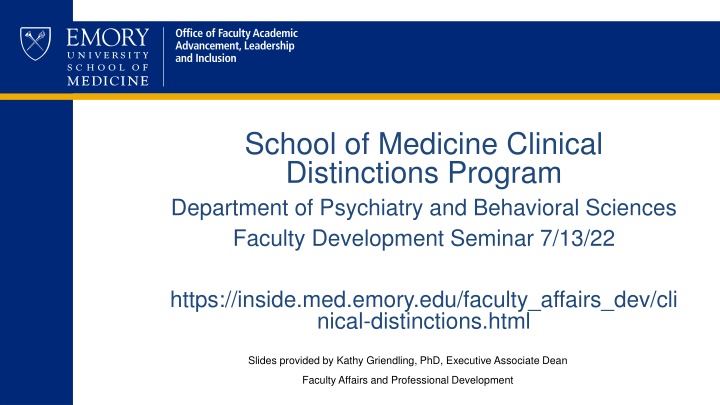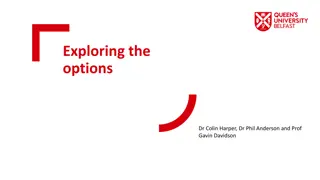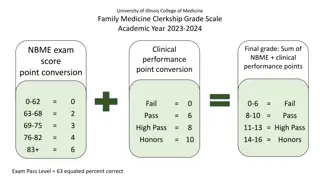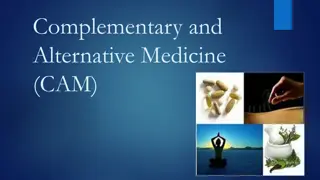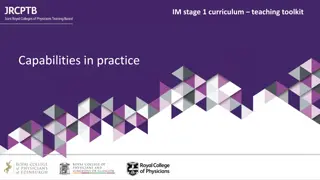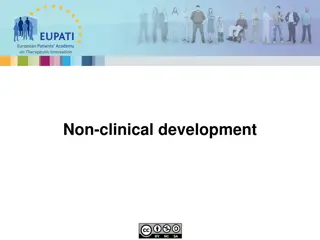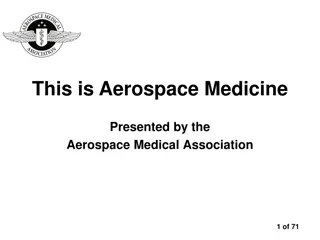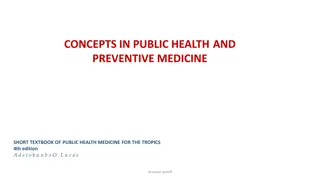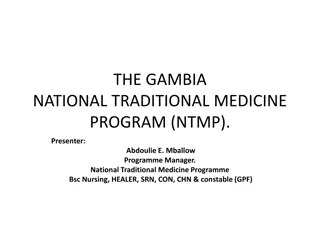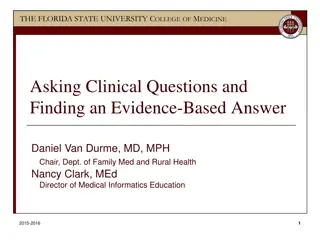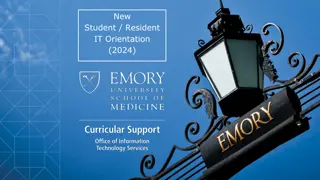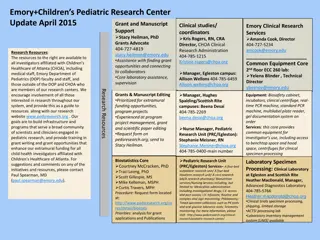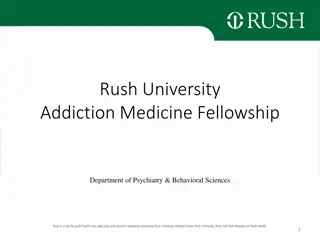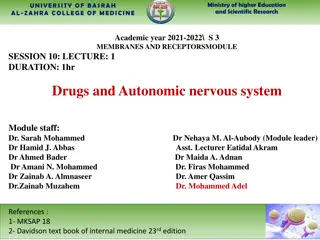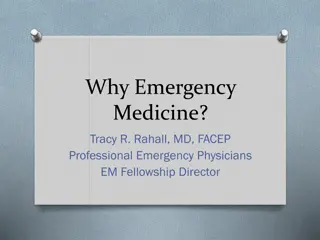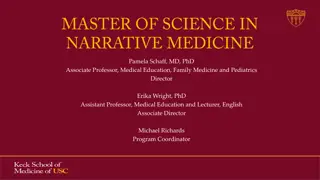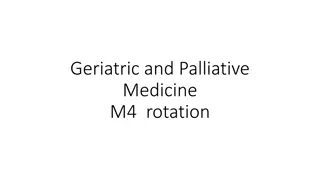Emory School of Medicine Clinical Distinctions Program Overview
The Emory School of Medicine Clinical Distinctions Program aims to recognize faculty members and physicians for their outstanding clinical service. The program categorizes eligible candidates into three levels based on years of academic clinical service and leadership roles. Candidates are evaluated on quality of care, patient satisfaction, innovation, citizenship, and contributions to teaching.
Download Presentation

Please find below an Image/Link to download the presentation.
The content on the website is provided AS IS for your information and personal use only. It may not be sold, licensed, or shared on other websites without obtaining consent from the author.If you encounter any issues during the download, it is possible that the publisher has removed the file from their server.
You are allowed to download the files provided on this website for personal or commercial use, subject to the condition that they are used lawfully. All files are the property of their respective owners.
The content on the website is provided AS IS for your information and personal use only. It may not be sold, licensed, or shared on other websites without obtaining consent from the author.
E N D
Presentation Transcript
School of Medicine Clinical Distinctions Program Department of Psychiatry and Behavioral Sciences Faculty Development Seminar 7/13/22 https://inside.med.emory.edu/faculty_affairs_dev/cli nical-distinctions.html Slides provided by Kathy Griendling, PhD, Executive Associate Dean Faculty Affairs and Professional Development
What are Clinical Distinctions? Andrew Furman, MD
Background Desire for a recognition program for clinical service of Emory School of Medicine faculty and ESA physicians Precedence Other universities have developed such titles (Harvard, Mt Sinai) Retention tool Department of Medicine has developed and initiated program 3 years of experience administering it Now beginning it s third year in SOM
Program summary Senior physician/psychologist excellent clinical care, current on new techniques, participation in citizenship and administration (4 years academic clinical service) Distinguished physician/psychologist outstanding clinical care and reputation, integrates new approaches, expanded participation in citizenship and administration (8 years academic clinical service) Eminent physician/psychologist exemplary clinical reputation, leadership in practice optimization, often significant administrative leadership, leadership in teaching and service at Emory and beyond. (12 years academic clinical service) *Years are SOM minimum. Psychiatry assumes higher years of service (e.g., > 6 years for senior; > 10 years for distinguished; > 20 years for eminent) ** Board certification required for all levels for physicians and psychologists (ABPP)
Metric Senior Physician/Psychologist Distinguished Physician/Psychologist Eminent Physician/Psychologist Quality of Care and Patient Satisfaction Evidence of excellence in the provision of clinical services and the delivery of expert, compassionate care is required. Evidence of the provision of outstanding clinical care and acknowledgement of clinical reputation is required. Reputation among colleagues is required. Regional reputation is optional. Candidates will be widely regarded as exemplary master clinicians and acknowledged and sought after as clinical experts in respective specialties at least at the regional to national levels. Innovation Candidates should be current on new techniques and methods of thinking and incorporate them into their practice of medicine as appropriate. Candidates are expected to integrate new approaches in the field into clinical practice. Candidates will demonstrate leadership in practice optimization, incorporating the latest standards and procedures into the provision of exemplary clinical services. Citizenship Candidates are expected to maintain required certifications and participate in annual performance reviews grand rounds, committees, etc. Contributions to teaching and mentoring will be recognized. Candidates are expected to expand their participation/leadership in clinical mission critical areas of departmental, SOM, and WHSC activities. Participation in professional organizations and high quality teaching and mentoring will be recognized. Candidates are expected to lead mission critical areas in the organization and to play significant roles on committees in the department, SOM, and WHSC and participate in professional societies, with some leadership roles. A successful record of educating and mentoring colleagues and trainees will be recognized. Administration Candidates may be recognized for their administrative contributions to the delivery of care and demonstrate a positive impact on their clinical practice. Candidates may be recognized for their administrative contributions to care delivery and for developing innovative changes at the section level that have a positive impact. Candidates may be evaluated on the basis of their significant administrative contributions at the highest levels of the organization, including developing and implementing innovative changes for multiple sites that have a positive impact on quality of care, scope of services, etc.
How the Program Works Candidates self-nominate and/or are nominated by Vice Chair/Chief of Service Committee on Clinical Distinctions does an initial vetting, and if the candidate likely meets criteria, is asked to complete application Candidate submits materials to the Departmental Committee on Clinical Distinctions (CCD) and a Chair s letter is generated Approved departmental actions submitted to School of Medicine CCD Approved actions on consent agenda of COC; opportunity for Chair to appeal declinations Distinction takes effect September 1 each year
Eminent Distinguished Senior
Link Between Clinical Distinctions and Academic Promotion Nadine Kaslow, PhD, ABPP
Link Clinical distinctions are distinct from academic promotions Many faculty will only pursue one course or the other, although some faculty will pursue both if choose to pursue both, there is no specific order to do so A clinical distinction could be used to support service Providing high-quality patient care - Involvement Providing clinical service above and beyond peers in quantity and quality Achievement
Why Should I Apply for a Clinical Distinction? Nadine Kaslow, PhD, ABPP Jennifer Wootten, MD Patrick Amar, MD Chanda Graves, PhD, ABPP Liza Zwiebach, PhD Bobby Elliott, MD
How Do You Apply for a Clinical Distinction? Andrew Furman, MD Jeffrey Rakofsky, MD Rob Cotes, MD Toby Goldsmith, MD Gene Farber, PhD, ABPP Erin Elliot, PhD, ABPP
Submission Materials 1. CV (SOM format) 2. Clinical Service Statement 3. Letter cosigned by the Chair, Division Director, and Service Chief, as applicable, including supporting metrics 4. Letters of support (Required minimums- can have more) a. Senior: 1 internal (from Emory) or external (from non-Emory entity) letter b. Distinguished: 1 external and 1 internal letter c. Eminent: 2 external letters, 1 internal letter 5. Optional a. Up to 2 letters of support from staff b. Patient comments
Service Statement 1. Quality of Care and Patient Satisfaction [required](use this section to describe your clinical service contributions, including metrics to support the quality of your care, your referral base, etc.) 2. Innovation [encouraged](describe any new programs or procedures that you have brought to Emory, or any process improvements that have led to better patient care) 3. Citizenship [required](describe citizenship activities, such as participation in grand rounds, required certifications, teaching, mentoring, committee work, etc.) 4. Administration [optional](use this section to describe your administrative contributions to patient care, e.g., directorships, patient access improvements, etc.)
Questions? Andrew Furman, MD afurman@emory.edu Nadine Kaslow, PhD, ABPP nkaslow@emory.edu https://inside.med.emory.edu/faculty_affairs_dev/clinica l-distinctions.html
